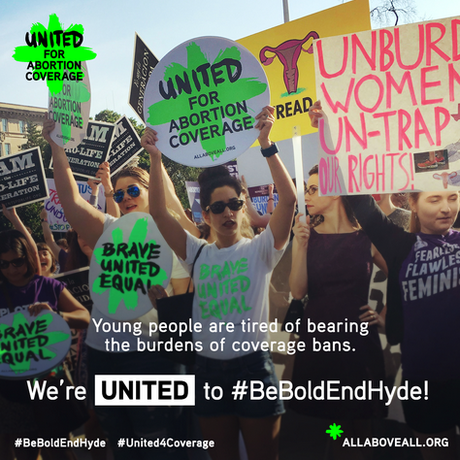
Credit: All Above All
As a college student in Ohio, I have seen what happens when anti-choice politicians decide they know what’s best for other people and it is not pretty. Watching friends go through intense anxiety while trying to figure out how to get a quick, close, and affordable abortion in their own state has been discouraging and disheartening. From the lack of accessible abortion clinics in rural areas to the recent defunding of Planned Parenthood in the state, anti-choice policy has resulted in disaster for Ohio residents.
Living in a community plagued with these issues and witnessing these experiences have led me to speak out and take action. With the help of national pro-choice organizations like URGE and All Above All, I’ve helped organized lobby days and abortion access tours on my campus so my fellow students could speak out against attempts to limit comprehensive sex ed, reduce abortion access, or otherwise make it harder for us to make informed decisions about our lives, health, and futures. You may not see us on the news every day, but make no mistake: students like me are fighting hard to keep lawmakers from passing new laws that take away our agency when it comes to our health decisions.
During my times as an activist, we’ve certainly seen reproductive rights victories. In June, for example, the Supreme Court made the monumental decision to protect and reaffirm the constitutional right to abortion by striking down Texas’ unconscionable clinic shutdown law. Reproductive health activists all over the country celebrated the decision, which was seen as a successful step towards achieving a political landscape in which abortion is accessible to all who need it.
But even on the heels of this monumental victory, we cannot be content to rest. Now we’re tackling one of the foulest, strictest, and harshest of abortion barriers: the Hyde Amendment. The Hyde Amendment, named for its original author Congressman Henry Hyde (R-IL), bars the use of federal funds to pay for abortion services. For four decades, politicians have used the Hyde Amendment to deny coverage of abortion to anyone enrolled in Medicaid. To put it bluntly, the amendment has allowed Congress to legally deny a constitutionally protected right to people just because they are poor.
This year marks the 40th year of the Amendment — and with it an opportunity to reflect on the terrible impact this policy has had on women for decades. For 40 years, this ban has particularly interfered in health decisions made by women who are already struggling to make ends meet. Restricting Medicaid coverage of abortion forces one in four poor women seeking abortion to carry an unwanted pregnancy to term. This coupled with the fact that a woman who wants to get an abortion but is denied one is more likely to fall into poverty than one who can get an abortion, is troublesome and ultimately violent. Over the years, the Hyde Amendment has been further extended to deny coverage to federal employees and their dependents, military service members, Native Americans, Peace Corps volunteers, immigrants, and residents of Washington, D.C. Young people in particular have also been harmed, as we often struggle to put together the money to obtain an abortion.
Rich women have always been able to get abortion care, even if doing so has required expensive travel or hiring private doctors. But for most women and families who don’t have unlimited resources, paying out of pocket for any healthcare can push family budgets to the breaking point or simply be impossible. No one should have to choose between paying rent or paying for health care that supposed to be a constitutional right in the first place. The type of insurance someone has —whether public or private — should not dictate their access to the full range of pregnancy-related care, including abortion. Ultimately, we have to acknowledge that marginalized and oppressed communities are hit hardest by the Hyde Amendment because they are the very groups the Hyde Amendment targets.
Voters in the U.S. who believe in the right to choose cannot sit idly by for another 40 years of Hyde — action is not only important but necessary. This is why I’m joining college students across Ohio to spread information about the harms of Hyde and how we can overturn it. Simple actions like tabling, chalking, and speaking at public events help make a difference and educate others about why Hyde has to go.
At its core, Hyde is a piece of legislation that aims to politicize and regulate women’s decisions. But however an individual may feel about abortion, no one should be cut off from the care they need based on the money in their bank account. We must be better, and demand better of our policymakers.
This post is part of the United for Abortion Coverage Week of Action. Join using the hashtags #Access4All, #United4Coverage, and #BeBoldEndHyde.

